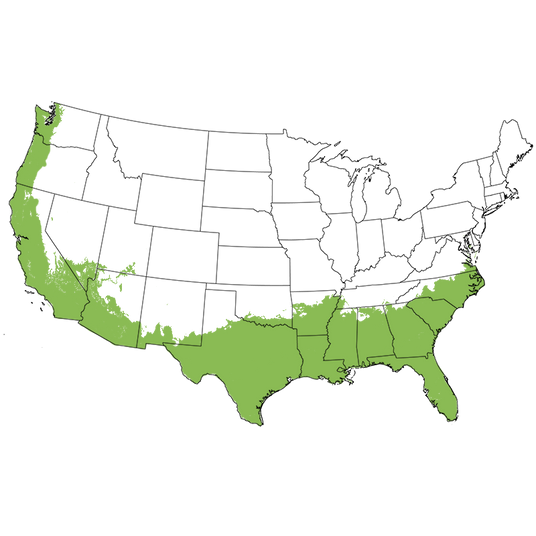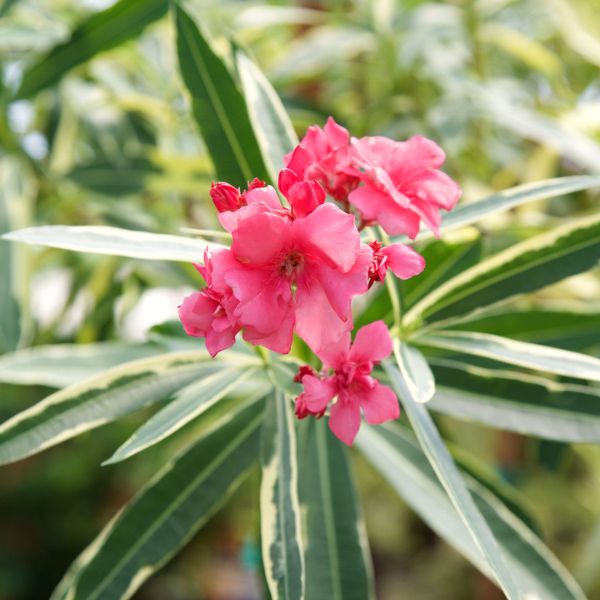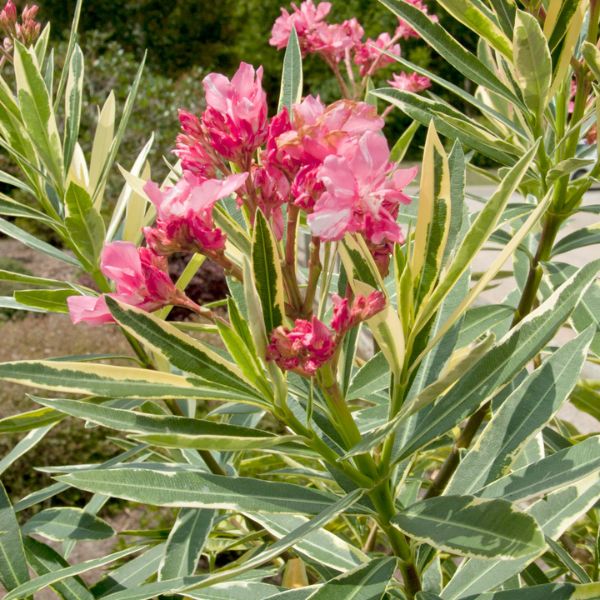Twist Of Pink Oleander Tree Form
Oleander nerium 'Planst'
Delivery and Shipping
Delivery and Shipping
Preorder Shipping Schedule
We ship your plants when it's safe to transport them to your zone. Dates are estimated and subject to weather delays.
| Zone 3-4 | Week of March 30th |
| Zone 5 | Week of March 16th |
| Zone 6 | Week of March 2nd |
| Zone 7-12 | Week of February 23rd |
Shipping Rates
Ships in 3-4 business days • Tracking provided • Weather protected
| Under $50 | $9.99 |
| $50 - $99.99 | $14.99 |
| $100 - $149.99 | $16.99 |
| $150 - $198.99 | $24.99 |
| $199+ | FREE |
✓ Zone-specific timing • ✓ Professional packaging • ✓ Health guarantee

Plant Sentry™ Protected
Your order is protected by our compliance system that:
- Prevents restricted plants from shipping to your state
- Ensures plants meet your state's agricultural requirements
- Protects gardens from invasive pests and diseases
Tough as Nails, Pretty Oleander Has A Long History
- Fabulous Summer Flowers
- Rich Evergreen Foliage
- 'Plant It and Forget It' Tough
- Drought Tolerant
- Great in Containers
- Historical Plant Used Throughout Asia, Africa & the Mediterranean
- Screening or Specimen in Large Landscapes
- Works on the Coast
- Not Recommended for Use Near Stock Animals
- Teach Children to Leave Oleander Alone
Deer Resistant
Oleander (Nerium oleander) is a plant with a past. People love the beautiful Oleander flowers, and they have graced gardens in Asia, Africa and the Mediterranean since ancient times. They were grown in the famed gardens of Pompeii. No wonder it was brought to cultivate in the Galveston, Texas area in 1841.
These rugged garden plants caught national interest, and they found their way from Texas across the entire country. Oleander plants thrive in Zones 8 - 10 from Southern California with its dry heat, to both coasts, to the high heat and humidity of Florida and the Gulf Coast.
These large, pink flowering Oleander shrubs feature long, narrow lance shape leaves that capture the slightest breeze. The dazzling flowers persist from early summer to early fall.
They are well known for their ability to tolerate the harshest conditions, including drought, salt spray, reflected light from windows and painted walls, high heat and high humidity. It grows in either acid or alkaline soils. They may not be super fast-growing, but these medium growth rate shrubs add decent growth every year!
Oleanders have been used by city planners as freeway plantings for many decades. In some areas, you can drive for miles experiencing a kaleidoscope of color in the median strip. Why not line your long driveway with these time-tested shrubs?
Use Oleander wisely in your landscape. They make a wonderful hedge, a great screen plant as well as easily trained into a very beautiful accent and small tree. They can be trained as a multi or single trunk tree and make a great featured plant in the landscape.
These are perfect accent plants in even the most aggressively warm climates. They are quick growers to their full height and are perfect for fences, borders and property edges. Oleanders are evergreen shrubs that don't need to be pruned or fussed over. You can truly plant and forget them, once they are established.
They are evergreens, so the waxy, dark-green leaf color is on the plant year-round. They put on a flower show all summer long with gorgeous trumpet-shaped blooms. They are big enough to provide a sparkling background for other flowering shrubs in the border, too.
In higher humidity, the mildly sweet Apricot fragrance of the Oleander adds another landscape attribute. Covered in petite pink flowering variety features single flowers which fall cleanly from the shrub.
Nature Hills ships strong field-grown plants that will arrive at your doorstep in fabulous condition, ready to plant in your garden. Available also in white, pink Oleander and the other colors and specimens available to add variety to your landscape! Order these truly 'tough as nails' but beautiful Oleanders today!
How to Use Oleander in the Landscape
You can enjoy these incredibly rugged and drought-resistant plants in so many ways in your landscape. With their lovely leaves and bright pink flowers, they are truly standouts in any garden.
Up close, the leaves and flowers look dainty, but from a distance, the shrub shows off a rougher texture. These plants make the perfect large backdrop for garden borders.
Create living walls for special garden rooms or hide the more mundane utility areas of your garden.
Use them as a beautiful flowering windbreak at beach properties. Plant them in a staggered double row in a zig-zagging pattern.
Train one into a small accent tree by removing lower limbs. It can create a marvelous focal point in a drought-tolerant, xeriscape garden.
Mass them on tough, sunny sites, such as slopes. It's far easier and safer to allow them to grow into their full height and spread than to try to mow.
Line the perimeter of a large commercial or home property with a great-looking Oleander hedge. For a long, continuous hedge, plant Oleander 5 feet apart (you'll measure from the center of one to the center of the next.)
Oleander also makes a wonderful container plant and patio accent plant. Although it is not cold-hardy, people in colder climates can grow them as summer flowering container plants. In Zones 4 - 7, simply move them to an attached garage with a window in winter to protect them from the cold. Remember to water your containerized Oleander in winter!
#ProPlantTips for Care
In the home garden, care must be taken to avoid the highly toxic sap. While kids tend to steer clear of anything "green" like vegetables or Oleander, it's best to educate them early to leave this plant alone. Even though the leaves are extremely bitter and unpalatable, it is not a shrub recommended for use near livestock animals. Some people also have a sensitivity to leathery Oleander leaves. Wear gloves to avoid skin irritation while handling.
Oleander stays fresh and flowers with little assistance. However, you can prune it to encourage bushier growth and more flowers, and to reduce the size of the shrub.
It blooms on new wood. It's best to prune them after the summer blooms are finished.
Regularly remove damaged, crisscrossing or dead branches to keep your plants healthy. Be sure to bag and remove pruned branches from the site. The limbs and leaves should not be used as firewood or the limbs to cook with.
Once your plants are 10 years old, start a regular maintenance program of rejuvenation pruning. in spring, cut 1/3 of the oldest trunks off at the ground level in spring and remove them from your property. In a three-year period, you'll have a brand new shrub without losing valuable height.
Oleander tolerates a wide range of soil types and conditions and is as drought tolerant as a landscape shrub or tree can be. Water regularly for the first year and less the next year and needs very little supplemental water from then on.
The plant is adapted to almost all soils and can even tolerate brief periods of flooding. However, overwatering can lead to yellowing leaves. Best to keep this arid native on the dry side with well-drained soil. When supplemental water is given, water the soil at the roots and keep the leaves dry.
Apply a 2-inch layer of compost under the plant each spring to retain moisture and control weeds.
In containers, Oleanders require regular watering and must be fed a general-purpose fertilizer at least twice a season. Recommended application rate is once in the late winter and once in the late summer.
You'll love these plants that provide a burst of color in your yard. They'll grow beautifully, even in poor soil and extreme heat. Don't miss your chance - order today!
Frequently Asked Questions
Is Oleander poisonous to humans? Is Oleander poisonous to touch?
Oleanders are fast-growing and easy to care for broadleaved evergreens which tolerate salt spray and drought, and their flowers are wildly showy which makes them appealing landscape plants. However, all parts of this plant are highly toxic. Wear gloves and long sleeves when working with these plants, and dispose of trimmings and raked leaves away from your property.
How big does an Oleander tree get?
Oleander can reach a mature height of 6-15 feet tall and can spread 5-10 feet in width in optimal conditions.
Is it safe to grow Oleander?
Oleander is safe to grow when used appropriately as an ornamental flowering tree or shrub. Wear gloves when handling and pruning and keep children and curious pets away from the branches, flowers and foliage. Even a small amount can cause issues and skin irritation.
How to Care for an Oleander Tree?
Oleander thrives in full sun and moderate moisture and once they’re established, Oleander becomes very drought tolerant and is extremely easy-care.
What Shipping Options Do You Offer?
NatureHills.com works closely with our growers and nursery professionals to ensure we ship when it is most appropriate for your area. Our goal is to deliver the hardiest plants by avoiding extreme high and low temperatures. Check out our shipping schedule for more information and to learn our wills and won’ts when it comes to shipping plants. Find your Oleander for sale here at NatureHills.com!
-
Botanical Name
-
Growing Zones
-
Height
-
Width
-
Sunlight
-
Growth RateModerate
-
Flower Color
-
Leaf Color
-
Bloom PeriodEarly Summer, Late Summer
-
Does Not Ship ToAK, HI, ID, MT





